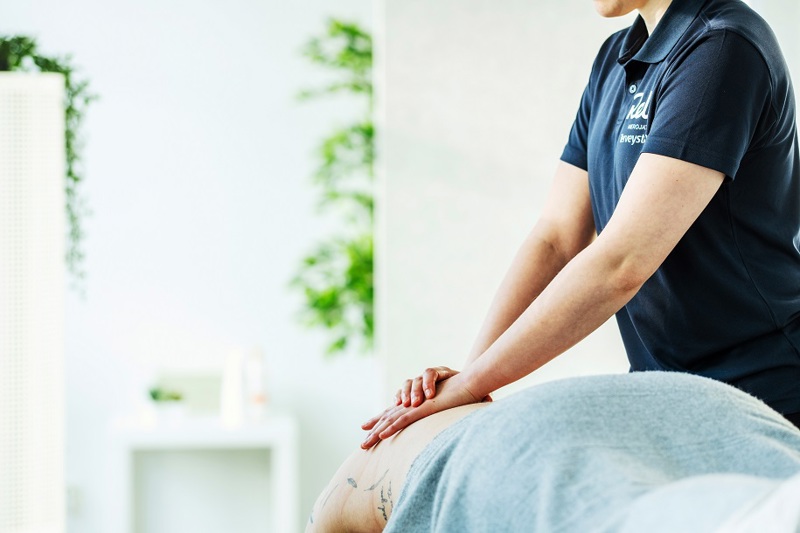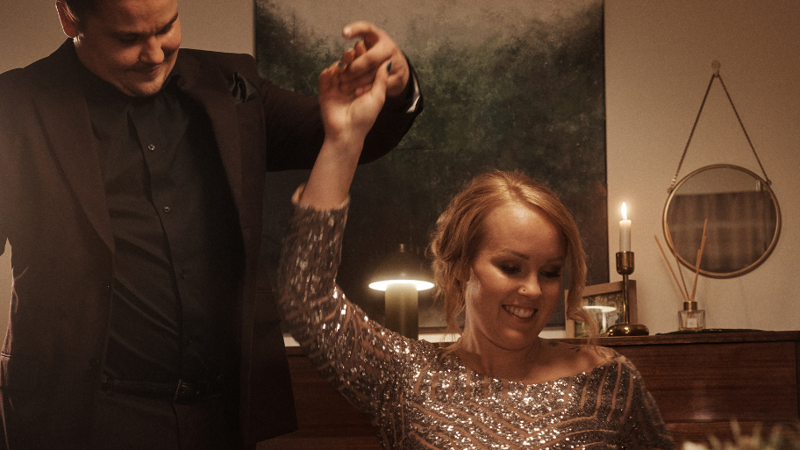Four relaxation exercises for the whole family for the Christmas rush
Christmas can be a busy and hectic time for families with children. A moment of peace and quiet with your family is an invaluable opportunity to enjoy Christmas.

The best Christmas gift for yourself and the whole family is recognising the need for breaks and relaxing together.
– When you think about where you feel tired and stressed most often, it's easier to stop when you need to. Some people feel more overstimulated when they are stressed, while others feel powerless and exhausted. Examples of the need for a break include stiff shoulders, poor sleep, a tense temper or feeling all over the place," says Katri Laine, a psychologist and trainer psychotherapist at Terveystalo.
– In young children, the signs are similar. On the other hand, children may also express tiredness, be serious and lie down," Laine continues.
Relaxation exercises are also worth doing with young children
Relaxation moments teach both adults and children to listen to themselves and to stop and think about themselves.
– With a safe adult, a child learns good self-regulation. The ability to stop and rest - a skill that carries through life - is also important. Age-appropriate calming exercises can be done with children.
– Young children cannot concentrate on still meditation or emptying their minds without stimulation. They need the help of a calm adult to relax.
Good relaxation exercises for the whole family
- It's easy for both adult and child to focus on touch. Giving a massage, stroking or running a feather along the body's boundaries, for example, will naturally make you stop. The adult can first stroke the child and then the other way round.
- Listening to a quiet song together under a blanket calms the body and mind.
- With slightly older children, you can listen together to a guided meditation exercise, for example.
- Everyday moments of relaxation are also calming: enjoying the warmth of the Christmas sauna together, lounging on the same sofa and reading, drinking mulled wine and looking at a candle or fireplace.
Calming moments restore the emotional connection with the self
We are constantly on the receiving end of information and stimuli in our everyday lives. As a result, we very easily lose touch with ourselves.
– When we are disconnected, we are unable to meet our own needs and take care of ourselves in the best possible way. When we calm down, we turn our attention from the stimuli of the outside world to our own bodies and minds. At best, this has a tangible effect on the body: our muscles relax, we sleep better, our chest gets bigger and our heart rate and blood pressure go down," says Laine.
Take it easy at Christmas: feeling good is not something you perform
Life is always random and uncontrollable.
– And even when things go according to plan, you can be left with an empty feeling inside. A good feeling doesn't necessarily come from doing. But the rewards of relaxation and calming down are quick: when the body relaxes and the mind lets go of obligations, you realise that you don't really need much else to feel good," concludes Katri Laine.
Read more occupational health articles

Terveystalo's digital services have been awarded the internationally recognized ISO27001 information security certification.
Terveystalo's information security practices, processes, and risk management are in line with international best practices.

Does massage help relieve stress? – Touch restores and calms the body and mind
Stress is not always visible on the outside, but the body does show signs when the strain increases. According to Lassi Ylönen, a trained massage therapist at Terveystalo Rela, the body often communicates stress through subtle signs.

Circular economy and artificial intelligence boost performance and improve care
At the heart of sustainable healthcare, technology serves as a tool for improving both the quality of care and accountability. Terveystalo favors solutions that combine sustainability, cost-effectiveness, and medical expertise.

Psychologist: How to make Christmas a relaxed and personal celebration
For many, the anticipation of Christmas begins when cities are decked out in seasonal lights and the first chocolates, calendars, and gingerbread cookies appear on store shelves. Christmas carols ring out and the Tonttuparaati choir sings “Kiire jo on! Kiire jo on!” (Hurry up! Hurry up!). This warm and atmospheric celebration also brings other feelings to mind: how on earth can we get through all this without losing our joy and peace in the rush?

Terveystalo and Gosta Labs deepen their cooperation: the goal is to streamline work with a superior patient information system
Terveystalo is deepening its cooperation with Finnish health technology company Gosta Labs and investing €1 million in the company as a minority investor. The aim is to jointly develop artificial intelligence solutions that improve the quality of care and the efficiency of reception work as part of Terveystalo's new patient information system, Terveystalo Ella.

First aid preparedness in companies requires action and courage
First aid skills increase resilience, but a barometer survey of Finnish organizations' first aid capabilities published in October reveals that the number of trained personnel is alarmingly low.